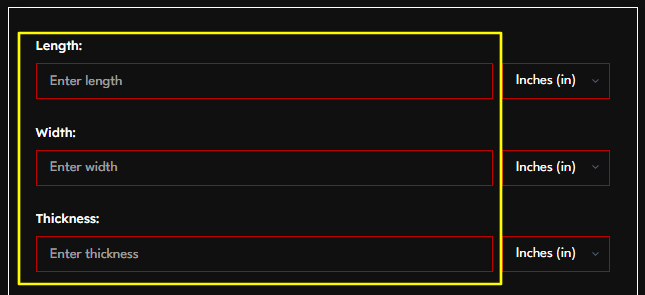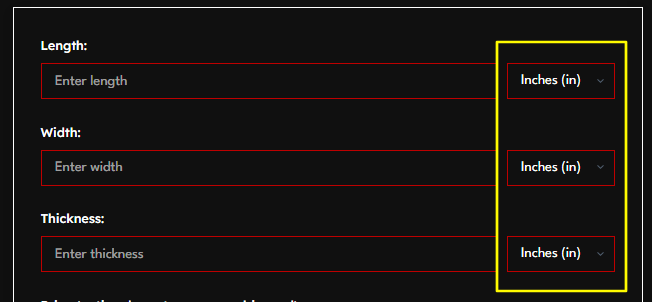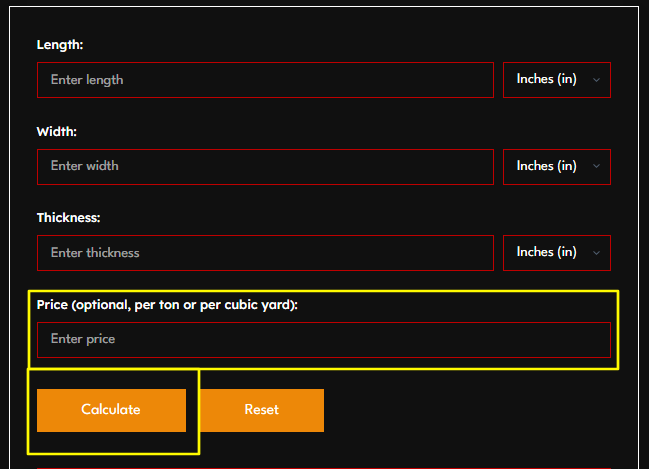Asphalt Calculator
Access More Tools
Asphalt Calculator
If you’re planning to build a road, pave a driveway, or work on any project that requires asphalt, one of the first questions you’ll ask is, “How much asphalt do I need?” Calculating the right amount of asphalt can be tricky, especially if you’re not familiar with the process. That’s where our Asphalt Calculator comes in! This easy-to-use tool helps you estimate the amount of asphalt required for your project, saving you time, money, and effort.
In this article, we’ll explain how the Asphalt Calculator works, why it’s useful, and how you can use it to get accurate results. We’ll also cover some basics about asphalt, its applications, and tips to ensure your project runs smoothly.
What is the Asphalt Calculator?
The Asphalt Calculator is a simple yet powerful tool designed to help you estimate the amount of asphalt (also known as hot mix asphalt, blacktop, or tarmac) needed for your project. Whether you’re paving a driveway, repairing a road, or working on a parking lot, this calculator takes the guesswork out of the equation.
How Does It Work?
The calculator uses basic measurements like length, width, and thickness to determine the volume of asphalt required. It then converts this volume into weight (in tons or pounds) based on the standard density of asphalt. Here’s how it works in detail:
Input Your Measurements: Enter the length, width, and thickness of the area you want to pave. You can use different units like inches, feet, meters, or yards. For example, if you’re paving a driveway that’s 20 feet long, 10 feet wide, and 4 inches thick, you’ll enter these values into the calculator.
Calculate: The tool instantly calculates the volume of asphalt needed in cubic yards or cubic meters. It uses the formula:
Volume = Length × Width × Thickness.Get Weight and Cost Estimates: The calculator also provides the weight of the asphalt in tons or pounds. If you enter the price per ton, it will even estimate the total cost of the asphalt. For instance, if the calculator shows you need 5 tons of asphalt and the price is 100perton,thetotalcostwillbe100perton,thetotalcostwillbe500.
How to Use the Asphalt Calculator
Using the Asphalt Calculator is straightforward. Here’s a step-by-step guide to help you get started:
- Enter the Length: Measure the length of the area you want to pave and enter it into the calculator. For example, if your driveway is 30 feet long, input “30” in the length field.
- Enter the Width: Measure the width of the area and input it. If your driveway is 12 feet wide, enter “12” in the width field.
- Enter the Thickness: Decide how thick you want the asphalt layer to be (usually 2-4 inches for driveways) and enter the value. For example, if you want a 3-inch thick layer, input “3” in the thickness field.

Select Units: Choose the units for each measurement (e.g., feet, meters, inches). The calculator supports multiple units, so you can use the ones you’re most comfortable with.

Optional: Enter Price: If you know the price per ton of asphalt, you can enter it to get a cost estimate. This is helpful for budgeting your project.
Click Calculate: The tool will instantly display the volume, weight, and cost of the asphalt required. For example, it might show that you need 2.5 cubic yards of asphalt, weighing 4.5 tons, with a total cost of $450.

Why Use the Asphalt Calculator?
Accuracy: The calculator uses precise formulas to ensure accurate results, so you don’t end up with too much or too little asphalt. This is especially important for large projects where even a small miscalculation can lead to significant waste or additional costs.
Time-Saving: Instead of doing manual calculations, which can be time-consuming and prone to errors, you can get results in seconds. This allows you to focus on other aspects of your project.
Cost-Effective: By knowing exactly how much asphalt you need, you can avoid overspending or wasting materials. This is particularly useful for budget-conscious projects.
User-Friendly: The tool is designed to be simple and easy to use, even for beginners. You don’t need to be a math expert or a construction professional to get accurate results.
Tips for Using the Asphalt Calculator
- Add Extra Material: It’s always a good idea to purchase 5-6% more asphalt than calculated to account for irregularities, waste, or errors in measurement. For example, if the calculator says you need 10 tons, consider buying 10.5 or 11 tons.
- Check Density: The calculator uses a standard asphalt density of 145 lbs/ft³. If your asphalt has a different density, adjust the results accordingly. You can ask your supplier for the exact density of the asphalt you’re using.
- Measure Carefully: Ensure your measurements are accurate to get the best results. For irregularly shaped areas, divide them into smaller sections (like rectangles or squares) and calculate each one separately. Then, add the results together.
What is Asphalt?
Asphalt is a sticky, black, and highly viscous form of petroleum. It’s commonly used for paving roads, driveways, parking lots, and more. Here are some key facts about asphalt:
- Durable: Asphalt can last over 20 years with proper maintenance. It’s resistant to heavy traffic and harsh weather conditions, making it ideal for roads and driveways.
- Recyclable: It’s one of the most recycled materials in the world, making it environmentally friendly. Old asphalt can be reused in new projects, reducing waste and saving resources.
- Versatile: Asphalt is used for roads, racetracks, tennis courts, and even waterproofing. Its water-resistant properties make it great for sealing flat roofs and coating pipes.
Types of Asphalt
Not all asphalt is the same. Here are the most common types and their uses:
- Hot Mix Asphalt (HMA): The most widely used type, ideal for roads and driveways. It’s produced at high temperatures, making it durable and long-lasting.
- Warm Mix Asphalt (WMA): Produced at lower temperatures, making it eco-friendly and suitable for cooler weather. It’s often used for paving during off-season months or at night.
- Driveway Mix: A cost-effective option designed specifically for driveways and parking lots. It includes crushed stone, sand, and gravel for added strength.
- Porous Asphalt: Allows water to drain through, making it perfect for areas that need good drainage. It’s more expensive but eliminates the need for additional drainage systems.
Why Accurate Asphalt Estimation Matters
Accurate asphalt estimation is crucial for the success of any paving project. If you order too little asphalt, you risk running out of material mid-project, which can lead to delays, increased costs, and an uneven finish. On the other hand, ordering too much asphalt can result in unnecessary expenses and wasted material. The Asphalt Calculator helps you strike the perfect balance by providing precise estimates based on your project’s dimensions. Additionally, knowing the exact amount of asphalt required allows you to plan your budget effectively and negotiate better prices with suppliers. By using this tool, you can ensure that your project stays on track, on budget, and delivers the high-quality results you’re aiming for.
Conclusion
The Asphalt Calculator is an essential tool for anyone working on a paving project. It simplifies the process of estimating how much asphalt you need, saving you time, money, and effort. Whether you’re a professional contractor or a homeowner paving a driveway, this tool ensures you get accurate results every time.
So, the next time you’re planning an asphalt project, don’t guess—calculate! Use our Asphalt Calculator to make your project smoother, faster, and more cost-effective.
